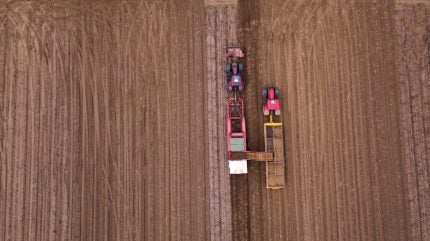
The UK’s food self-sufficiency is under threat because of a historically wet winter affecting crops, an energy and climate change think tank has warned.
Ahead of the government’s Farm to Fork summit with farming and food industry representatives in Downing Street tomorrow (14 May), the London-based non-profit organisation the Energy & Climate Intelligence Unit (ECIU) said its analysis suggests the country’s ability to feed itself is set to be reduced by 8% this year following one of the wettest winters on record.

Discover B2B Marketing That Performs
Combine business intelligence and editorial excellence to reach engaged professionals across 36 leading media platforms.
Heavy rain in the winter months left much of the country’s agricultural land saturated.
In a statement, the ECIU said “with soils too waterlogged and many fields flooded for much of the winter, many farmers have not been able to establish crops”.
It estimates that the reduction in key arable crops as a result of lower crop area and poor yields will reduce UK self-sufficiency by 8% when measured by volume, declining from an average of 86% between 2018 and 2022 to 78% this year.
It said the UK could become dependent on foreign imports for around a third of its wheat, with wheat self-sufficiency estimated to decline from 92% to 68% over the same period, while self-sufficiency in oilseed rape is estimated to plunge to an historic low of 40% from 75%.

US Tariffs are shifting - will you react or anticipate?
Don’t let policy changes catch you off guard. Stay proactive with real-time data and expert analysis.
By GlobalDataThe ECIU said that with other crops that have suffered due to the wet weather, such as field vegetables, potatoes and sugar beet, not included in its analysis, it is possible that an 8% reduction in headline self-sufficiency is an underestimate.
Linking the weather situation to climate change, Tom Lancaster, land analyst at ECIU said, “In 2021, the government warned that climate change was the biggest medium- to long-term threat to our food security. This analysis suggests that it is the biggest risk now, not at some far-off point in the future.
“Ultimately, we need to support our farmers to better cope with climate extremes, and Defra [the Department for Environment, Food and Rural Affairs]’s new green farming schemes will be crucial in this, building the resilience of our soils to floods and droughts, as well as planting trees and hedgerows that will trap carbon and slow flood waters.”
On the food summit, Lancaster said: “With its recent U-turns on climate policy, it’s possible the government will try to downplay the threat climate change poses to our food security at this summit, but farmers consistently report the changing climate is one of, if not the, greatest threats to their harvests. The only viable long-term plan for farming is getting to net-zero emissions when we are no longer making the problem ever worse.”
Just Food asked Defra to respond to the ECIU’s statement.
A Defra spokesperson said: “Food production, food security and backing our farmers are key priorities for this government and it’s why the Prime Minister is hosting the second UK Farm to Fork Summit.
“We are acutely aware of the impact the extreme weather can have on the farming community. We have protected over 900,000 acres of agricultural land from the impacts of flooding since 2015 and opened the Farming Recovery Fund, which provides grants of up to £25,000 ($31,350) to eligible farmers to return their land to the condition it was in before the exceptional flooding caused by Storm Henk.”





